‘Take Care of Maya’ trial: Jury deliberates in $220M case against All Children's Hospital
VENICE, Fla. - After two months, a jury in Sarasota County began deliberations Tuesday afternoon in a $220 million case against Johns Hopkins All Children’s Hospital that was at the heart of the Netflix documentary ‘Take Care of Maya’.
Lawyers on both sides presented their closing arguments before the judge handed over the case around 2:00 p.m. The Kowalski family sat close together, listening to the emotional closing in a case they’ve waited five years for a resolution.
"It was a totally dysfunctional organization and the Kowalski’s paid the price," said attorney Gregory Anderson.
Defense attorney Ethen Shapiro told jurors the hospital operated in the interest of Maya.
"Does Maya look happy in these photos? They tried to make this awful experience humane as possible, so they could take care of this child," said Shapiro.
Shapiro laid out a timeline, showing jurors red flags were raised by multiple staff members and pointed out concerns came from other hospitals as well.
"The coward's way out is to let them leave, people who care about children do not let that child let them walk out the door without talking to the family, this is alarming," he said.
Attorneys for the Kowalski family pointed out all was not well with the St. Petersburg hospital, with a culture of retaliation and retribution for staff members who raised concerns.
"Maya did not recover, everything she did herself in despite of Johns Hopkins All Children’s. They blamed Beata for taking her own life, the fact is that Beata was reacting to a maternal instinct," said Anderson.
No one knows yet what the jury will decide, but Tuesday's closing arguments brought some of them to tears.
"They would spend $100 or $1,000 an hour to spend that time with their wife or mother. We ask you to deliver them justice," said Nick Whitney, an attorney for the Kowalski’s.
The jury ended for the day after deliberating for about four hours after closing arguments, but they will continue Wednesday morning.
Why is Maya's family suing Johns Hopkins All Children's Hospital?
Maya Kowalski's family is suing Johns Hopkins All Children’s Hospital for $220 million, claiming its actions led family matriarch Beata Kowalski to take her own life. A judge ordered Maya to be sheltered at the medical facility under state custody while allegations of child abuse were investigated. The judge said Maya was not allowed to have physical contact with her mother. After 87 days without seeing her daughter, Beata Kowalski died by suicide.
For eight weeks, jurors heard from the Kowalski's, doctors, nurses and experts. Jurors will ultimately have to decide whether what happened to the Kowalski family could have been prevented and if the hospital’s actions pushed Beata Kowalski to take her own life. The Kowalski family says the hospital medically kidnapped Maya and battered her while in its care.
Defense rests case in 'Take Care of Maya' trial
Lawyers for Johns Hopkins All Children’s Hospital rested their case on Wednesday morning in a $220M lawsuit filed against the medical facility that was the premise of the Netflix documentary ‘Take Care of Maya’.
On Monday, the judge went over 80 pages of jury instructions with the jury. They will have to consider seven claims including:
- False imprisonment
- Battery
- Medical negligence
- Fraudulent billing
- Survivor claim for intentional infliction of emotional distress (Estate of Beata Kowalski)
- Wrongful death claim for intention infliction of emotional distress causing death
- Maya Kowalski’s claim for infliction of emotional distress
After jury instructions were read, one juror was dismissed for medical issues after a defense request to have a particular juror, who asked a lot of questions, reassigned as an alternate was denied.
Judge instructs the jury in ‘Take Care of Maya’ trial
Judge Hunter Carroll went over 80 pages of instructions with the jury on Monday afternoon.
Last week, the case nearly came to a standstill as the Kowalski's attorneys questioned a witness on the hospital’s Joint Commission review. They pointed out the hospital had an immediate jeopardy citation, which they believe was during the time Maya was hospitalized. Days prior, the hospital presented expert witness Mark Anderson who told the jury they met accreditation standards in 2016.
RELATED: Funding at risk after Johns Hopkins All Children's cited for 'immediate jeopardy to patient safety'
The Kowalski family’s attorneys said that could have misrepresented the St. Petersburg hospital’s image to the jury. While the defense team for the hospital said it was only for the hospital’s heart institute, the Kowalski’s attorneys wanted a closer look and so did Judge Hunter Carroll.
"This thing kind of exploding on the last day of testimony, the last thing I want to do is make a wrong call on this issue because this issue has the perspective of causing this whole thing to be done over again," said Judge Carroll.
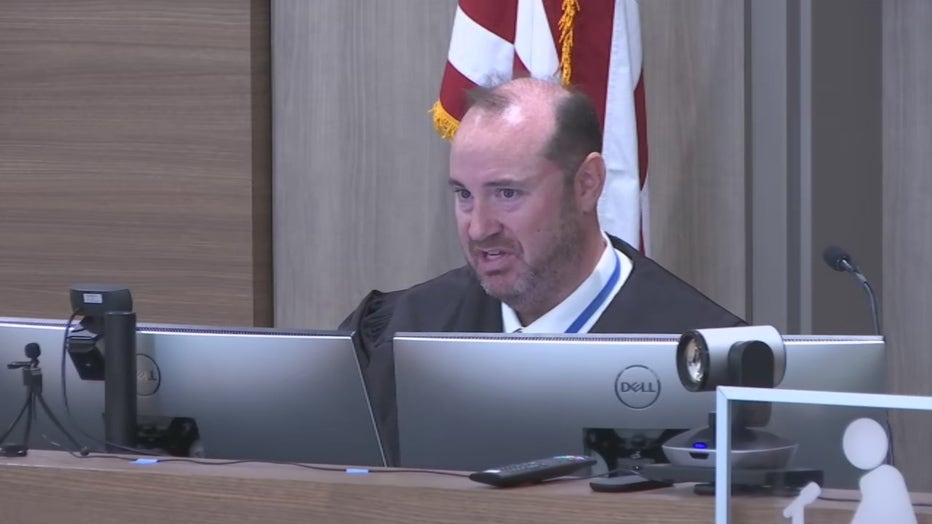
Judge Carroll listens to lawyers on both sides Monday morning.
Before the jury was in the courtroom on Monday, the Kowalskis’ attorneys told Judge Carroll they had not received corrective action plans, town hall meetings or internal emails until they did a deposition from a former hospital staff member. He said at that time they received a stack of documents that was 8–10 inches thick that correlated with fixing the cultural issues of Johns Hopkins All Children's Hospital not just with its Heart Institute.
RELATED: Fallout continues from All Children's federal report
The lawyers for the Kowalski family said that the information they were provided revealed a culture of retaliation and retribution for people who raised issues at Johns Hopkins All Children's Hospital. It has been noted that several nurse practitioners brought up issues at the hospital as early as 2015.
The attorneys added that the documents revealed that eight key executives were forced out during this time and the hospital conducted a massive re-education campaign encouraging all team members to speak up and speak out.
On Monday. the jury heard from Dr. Joseph Corcoran, a policy and procedure expert, before the plaintiffs rested their rebuttal case. He told the jury, despite claims from the St. Petersburg hospital that all was well, it was not. He stated that the hospital may have passed their accreditation, but they had several red flags raised, including how the hospital reported problems, complains and claims of mismanagement.
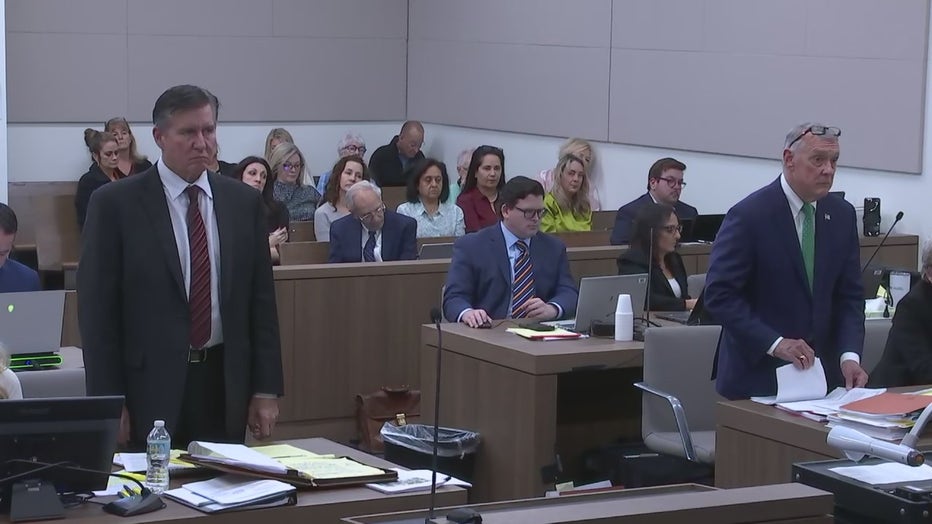
What Happened to Maya from ‘Take Care of Maya’?
The Kowalski's say they took Maya to Johns Hopkins All Children’s Hospital in October 2016 when she was experiencing a flare up of pain from Complex Regional Pain Syndrome, or CRPS, a disease she was diagnosed with by a doctor not affiliated with Johns Hopkins All Children's Hospital.
Maya told jurors her condition would leave her screaming in pain and unable to walk at the time. She said she had been receiving ketamine to treat the pain and even underwent a ketamine coma in Mexico.
RELATED: ‘Take Care of Maya’ trial: Maya testifies again in $220 million case against All Children’s Hospital
She explained that the ketamine treatment worked, and she was improving until the October 2016 flare up. During rebuttal testimony, her father said he decided to take her to the emergency room because she had a severe stomach ache, and he had never seen her in that much pain. It was noted during the trial that Maya had a ketamine treatment the day before.
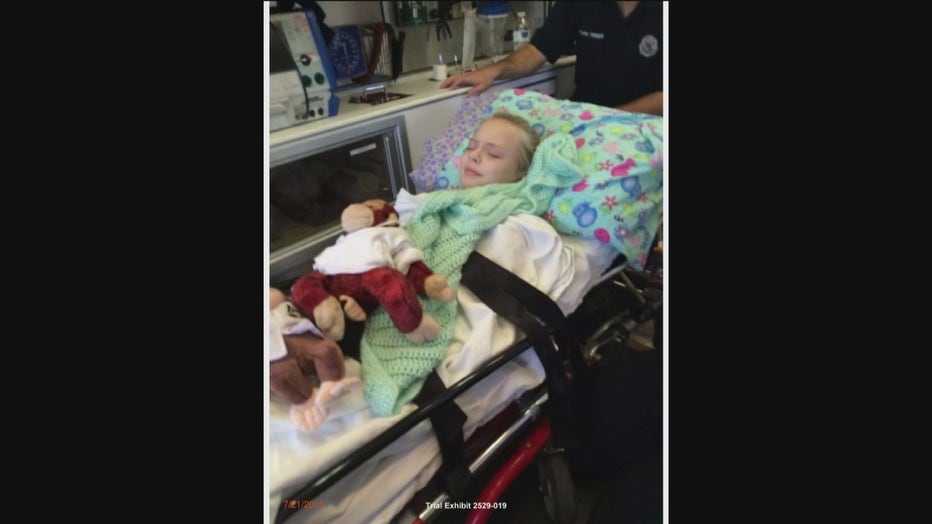
Pictured: Maya Kowalski
While at the hospital, Beata Kowalski insisted that Maya receive ketamine treatments, but hospital staff did not agree.
Beata Kowalski's persistence alarmed hospital staff, and they called in a report to the Child Abuse Hotline. They suspected Beata Kowalski, who was a registered nurse, was making her daughter sick.
When the hospital’s attorney, Howard Hunter, began his opening statements, he noted that several hospital staffers believed Beata Kowalski suffered from Munchausen by proxy (MBP) and they were trying to protect her.
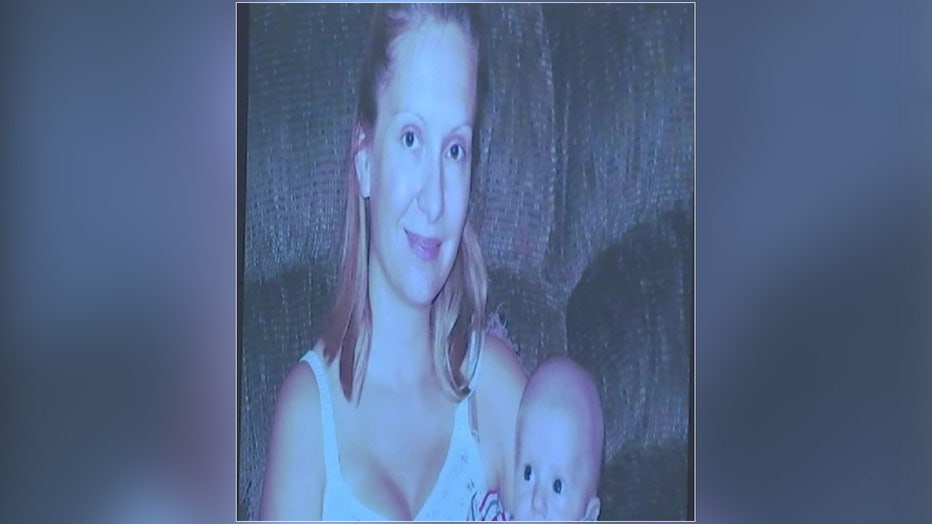
Pictured: Beata Kowalski
Maya said, during her three months in state custody at the hospital, there was a 48-hour period where she was isolated in a hospital room. Maya said staff wouldn't help her go to the bathroom and, instead, tried to see if she could actually walk, but she couldn't.
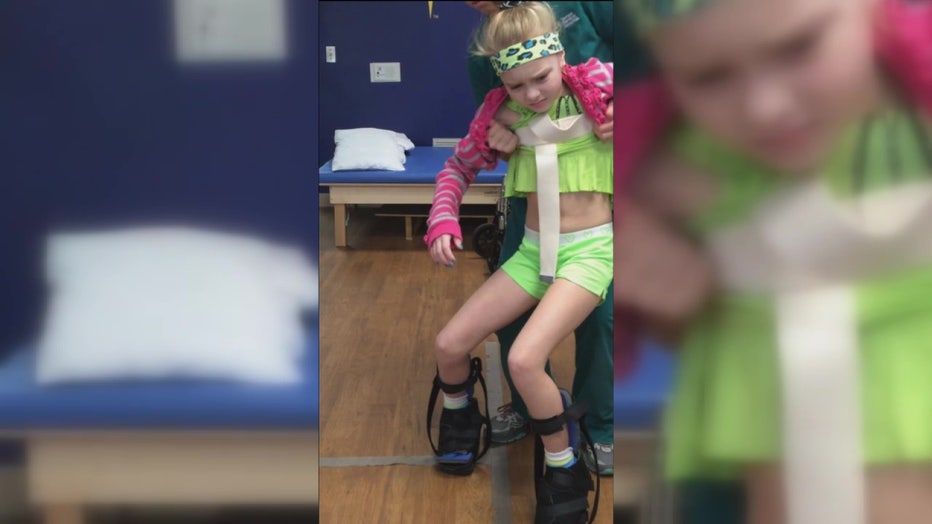
A video of Marissa Higgins helping Maya try to walk was shown in court on Friday.
"They left me there for 48 hours under surveillance, which they did not tell me about. They had a commode in there, and they just put it far enough away from the bed. So, I would have to physically stand up and use the bathroom," said Maya. "I called the nurses whenever I had to use a bathroom because obviously, I'm not able to walk. And when they refused to help me go to the bathroom, I would defecate on myself."
RELATED: ‘Take Care of Maya’ trial: Maya testifies in $220 million case against All Children’s Hospital
She described some nurses as mean and unhelpful, and others as compassionate and willing to help. Her testimony on Monday was emotional at times as she expressed her frustration.
"When I express to them a symptom or like my pain, they would say, 'No, you're making it up,' or 'it's in your head,'" Maya said.
Maya Kowalski takes the stand
On Monday, Maya Kowalski took the stand in the 'Take Care of Maya' trial and told the jury about her experience being in state custody while at Johns Hopkins All Children’s Hospital for three months.
Why did medical staff think Maya was being abused?
When critical care physician Dr. Beatriz Teppa-Sanchez took the stand, she described a chaotic scene when Maya and her mother, Beata Kowalski, first entered the pediatric intensive care unit.
She said Maya appeared to be in intense pain, though it was difficult to pinpoint where the pain was located. The doctor also said Maya kept demanding pain medication, which surprised her.
Dr. Teppa-Sanchez noted that Beata Kowalski said she had been very stressed and at times wanted to die and just go to heaven. The doctor added that Beata Kowalski said that when Maya was in a lot of pain, she too wanted to die and go to heaven.
The doctor told the jury she informed Beata Kowalski that the hospital could help her get resources to help, but the offer was declined.
Dr. Teppa-Sanchez said she felt those statements were even more reason for Maya to receive psychological help though Beata Kowalski said she didn’t want that for her daughter at that time.
Doctors, nurses testify in the ‘Take Care of Maya’ trial
Doctors and nurses who testified in court on Thursday described Maya and her mother as being aggressive in the hospital, swearing at medical professionals and demanding pain medication.
Nurse practitioner Johannah Klink echoed the statements of Dr. Teppa-Sanchez. She testified that Maya appeared to show more intense pain symptoms when her mother was present.
She went on to state that she witnessed Maya moving in ways that someone in intense pain would not be able to move such as get up on her knees on a hospital bed.
Klink also recalled Maya saying, "I’m tired of these lies. My whole life is a lie. That stuck me. That struck me very hard…It sounded to me like it was a cry for help."
However, during cross-examination, Klink told the jury that she never followed up on that statement or asked Maya to elaborate. She did note that she reported the statement to doctors.
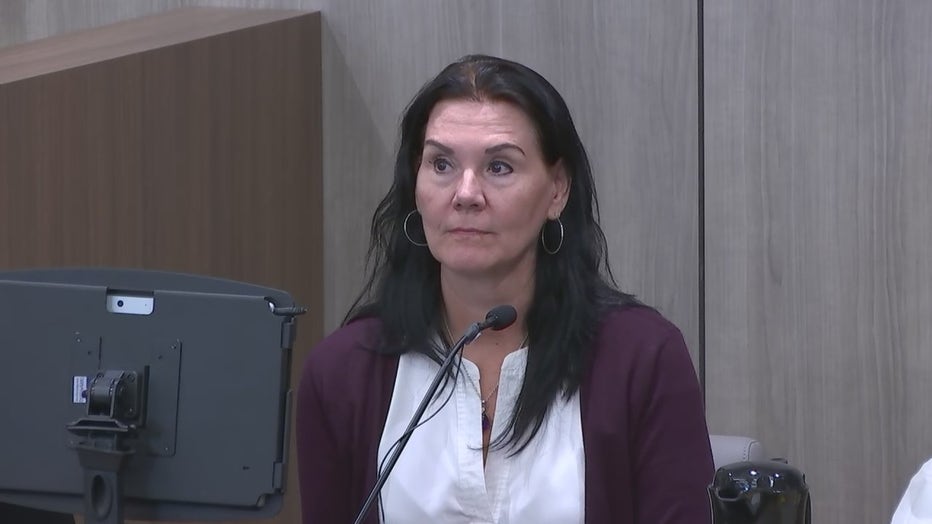
Nurse practitioner Johannah Klink testified for the defense.
Pediatric nurse Kelly Thatcher also told jurors that Maya’s behavior would change drastically when her mother was in the room.
She also claimed Beata Kowalski offered Maya Valium as a reward.
"Mrs. Kowalski was very upset, in her opinion, by the lack of medication that was being administered, and she did say, ‘She might as well be in hospice. That way she can have enough medication and let her die because she doesn’t deserve to live this way," Thatcher testified.
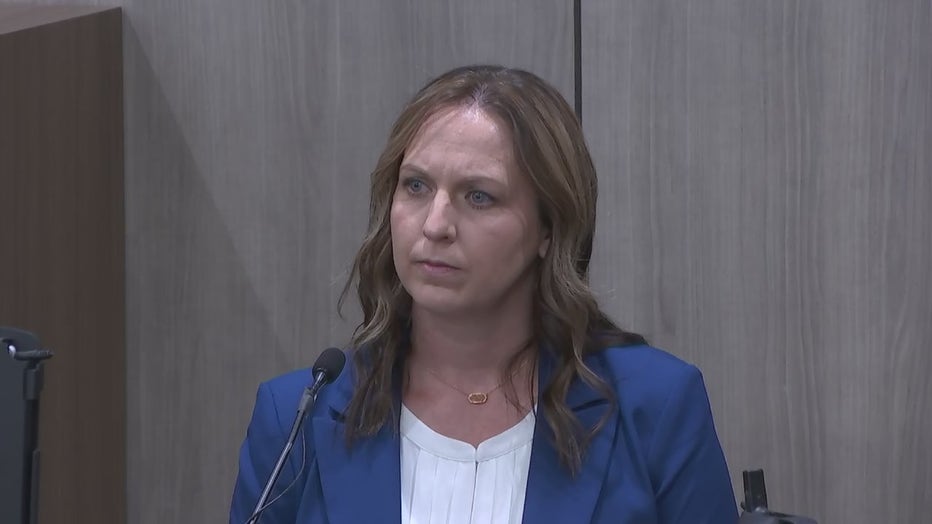
Pediatric nurse Kelly Thatcher testified on Monday.
Before the plaintiffs rested, psychiatrist Dr. Scott Richards took the stand and told jurors how he believed Beata Kowalski felt she had no choice but to end her life.
"I believe the impulse happened for Beata Kowalski when she finally had the impulse that ‘I can do no more. I’ve gotten everyone in my life involved, no one can seem to help,’" said Dr. Richards.
"I liken it to someone who is impulsively having emotions, they write an email, and they hit send, and they wish they hadn’t of sent it. In this case there was no delete. You couldn’t unsend the impulse," he added.
Psychiatrist testifies in 'Take Care of Maya' trial
On Monday, a physiatrist took the stand in a $220 million case against Johns Hopkins All Children's Hospital as defense attorneys began presenting their side.
Nurse practioner Bonnie Rice who worked at Tampa General Hospital and was a part of Maya’s care team in 2015, said Maya’s case was frustrating for the medical team because she said Maya and her mother weren’t open, and she couldn’t move them down the road of recovery.
Rice added that Beata Kowalski was strictly seeking medical help for her daughter when the team at TGH suspected Maya’s pain may be psychological.
The team at TGH weren't the only ones to raise psychological suspicions.
Case workers testify for the defense in ‘Take Care of Maya’ trial
Jurors in the Take Care of Maya' trial heard testimonies from new witnesses on Tuesday, including staff members from Safe Children Coalition.
Dr. James Lewis, a neuropsychologist and a consultant for the Child Protection Team, told jurors he met with Maya after staff at Johns Hopkins All Children’s Hospital raised concerns that her mother may have been medically abusing her.
In a video deposition, Dr. Lewis stated that he believed Maya may have been suffering from a psychological symptom of pain, which may have triggered physical pain symptoms.
According to testimony from Dr. Teppa-Sanchez, Johns Hopkins All Children’s Hospital did give Maya ketamine for her pain shortly after she was admitted, but it was at a lower dose than Beata Kowalski wanted for her daughter and staff wanted to wean her off of it.
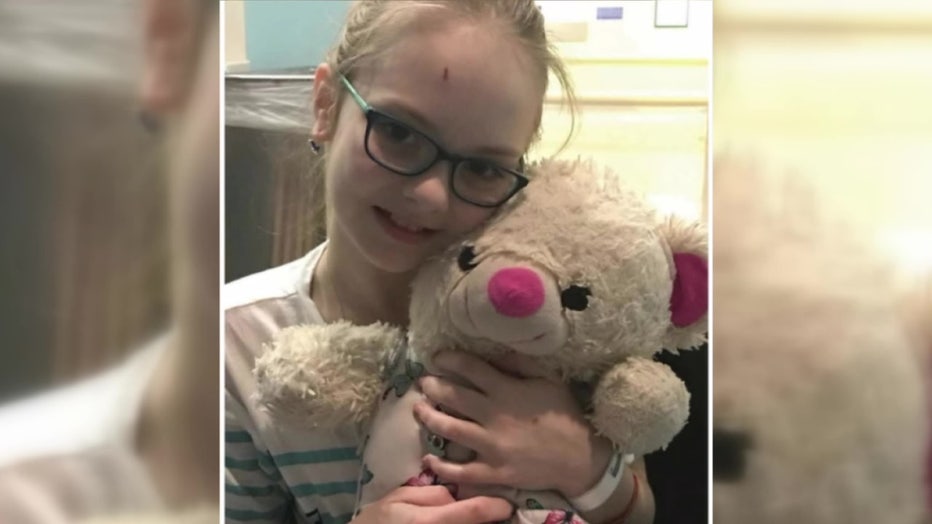
Pictured: Maya Kowalski
Dr. Teppa-Sanchez noted that she reached out to Dr. Sally Smith, a pediatrician who specialized in child abuse because she wanted her guidance on Maya’s case.
Dr. Smith took the stand for the defense last week. She was the medical director for the Child Protection Team in Pinellas County when Maya was in the hospital. She had worked for All Children’s Hospital for 12 years before it was acquired by Johns Hopkins and still had privileges at the facility.
Dr. Smith explained that she was contacted by Dr. Teppa-Sanchez shortly after Maya was admitted to the hospital because she was concerned about the amount of ketamine the child had been receiving to treat Complex Regional Pain Syndrome or CRPS, which was diagnosed by a physician not associated with the hospital.
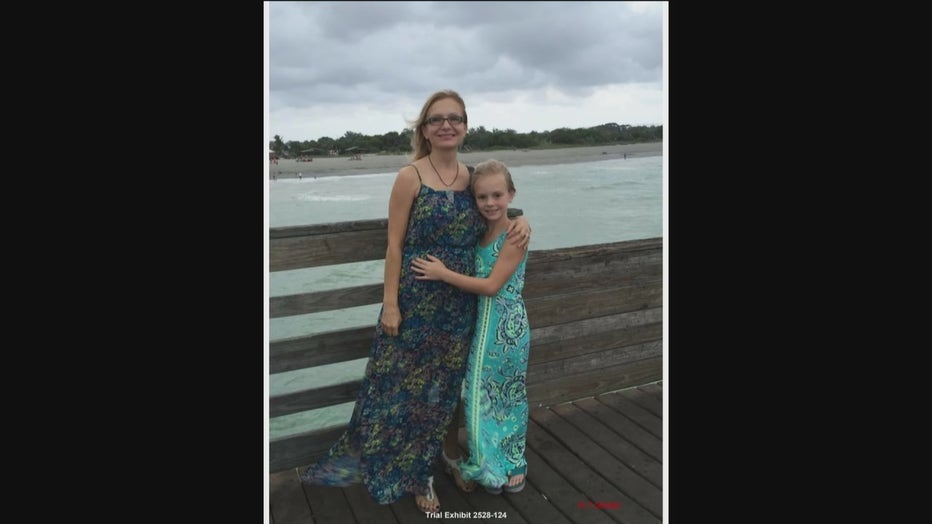
Pictured: Maya and Beata Kowalski
Dr. Smith told jurors she tried to give general advice in terms of how pediatricians can approach potential cases of Munchausen syndrome by proxy, or what she refers to as medical child abuse. However, she noted she could not do anything unless a report was made to the Child Abuse Hotline.
Two days later, medical staffers contacted the hotline, and a child abuse investigation began.
Dr. Sally Smith testifies in 'Take Care of Maya' trial
On Thursday, Dr. Sally Smith testified for the defense in a $220 million case against Johns Hopkins All Children’s Hospital that was the premise for the Netflix documentary ‘Take Care of Maya.’
Why couldn't Maya's family take her home?
Jack Kowalski, Maya's father, testified that his family was told they would be arrested if they left the facility with Maya after a judge ordered her to sheltered at the facility instate custody while the child abuse allegations were investigated.
He went on to describe how the hospital treated those who tried to visit Maya.
"Did you learn through the course of this that they believed Beata was slipping ketamine through the holy water and wafers?" the Kowalski's family attorney Greg Anderson asked.
"I know it didn’t happen, but they had all different ideas," Jack Kowalski replied.
Maya Kowalski's dad testifies
Maya Kowalski's father, Jack Kowalski, described the pain his daughter was experiencing as she suffered with Complex Regional Pain Syndrome when he took the stand Monday afternoon in a $220 million case against Johns Hopkins All Children's Hospital featured in the Netflix documentary 'Take Care of Maya'
Anderson argued those theories resulted in Beata Kowalski’s desperation and death by suicide.
"I saw my child deteriorating. I go home, I see my wife deteriorating," shared Jack Kowalski while on the witness stand.
PREVIOUS: ‘Take Care of Maya’ trial: What will the jury hear? Lawyers argue over evidence, witnesses in case
While on the stand, attorney Mark Zimmerman, who represented Maya when she was at Johns Hopkins All Children’s Hospital, said he felt as if the facility, and, in particular, social worker Catherine Bedy, tried to put up barriers for him to access Maya.

Beata Kowalski with Maya and Kyle
What happened with Catherine Bedy from ‘Take Care of Maya’?
The battery allegations from the Kowalski family stem from Bedy and others holding Maya down for unwanted photos and unwanted comforting. The Kowalski family dropped its case against Bedy shortly before the trial began.
On the stand, Bedy stated that she was often the person giving Maya bad news, including letting her know she would not be able to go home for Christmas.
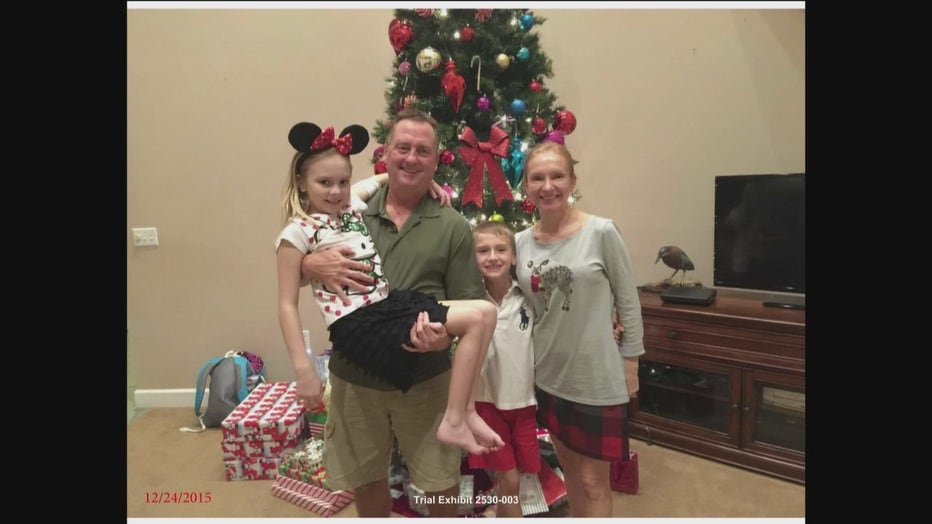
Kowalski family during a Christmas celebration before Maya was in the hospital.
"That was a really hard conversation," Bedy testified. "I went in and explained that to Maya and Maya was so upset. She was crying. She was just devastated, and she asked, she was just sobbing, she asked if she could sit in my lap and I said sure. I hugged her. She cried for a good ten minutes or so. She was mad and was saying all kinds of things about wanting to talk to the judge."
Bedy added that she wanted to provide comfort and support to Maya and that is the only reason why she had Maya sit on her lap. She said that was also the only time she had Maya sit on her lap.
She stated that contrary to Maya’s testimony, she never took the child into the chapel. But, on cross-examination, Bedy changed her statement and said she was in the chapel with Maya and her attorney, but she was never alone with her.
Social worker testifies in 'Take Care of Maya' trial
Jurors heard from social worker Catherine Bedy on Monday in the $220 million case against Johns Hopkins All Children’s Hospital that was at the center of the Netflix documentary ‘Take Care of Maya’.
Bedy recalled a day when she had to take photos of Maya before she left the hospital for court. Bedy said she and a bedside nurse went into Maya’s room and Risk Management was aware that photos were going to be taken of Maya.
Bedy stated that Maya was wearing a sports bra and shorts for the photos. She said that the bedside nurse removed Maya’s clothing. She said Maya was not happy that the photos were being taken.
"To be held against your will, being forced to take off your clothes in front of these strangers, essentially, it’s extremely uncomfortable. I don’t think I can convey to you how traumatic that was," Maya told jurors when she testified during the rebuttal.
On cross-examination, Bedy stated she did not have permission from her parents to take the photos, but she did have permission from the Department of Children and Families and Maya was in state custody at the time.
Social worker deposition in 'Maya' trial
Jurors in a Sarasota County courtroom watched a video deposition from social worker Catherine Bedy as a $220 million case against Johns Hopkins All Children’s Hospital featured in the Netflix documentary ‘Take Care of Maya’ continued Thursday morning.
Bedy's live testimony was the second time the jury heard from the social worker. They watched a video deposition of Bedy while the plaintiffs were presenting their case. During that deposition, Bedy admitted to being disciplined at work after an argument with a co-worker.
Bedy’s behavior was also a topic of discussion last week when Mark Anderson, who held several executive leadership positions at healthcare facilities, and was the chief operating officer for a children’s hospital in Wisconsin testified as an expert witness. He said after reviewing records from Human Resources, it appeared as though Bedy received counseling for her actions and Anderson saw no reason that would prevent her from being assigned to Maya's case.
A phone call between Beata Kowalski and Maya that was monitored by woman Maya identified as Bedy was also played in court. Charlotte La Porte, a manager for Pathways, stated that her voice could be heard in a recorded call redirecting conversation between mother and daughter after Beata Kowalski mentioned the case. When Bedy testified for the defense she also said that it was La Porte on the phone.
Bedy did admit though that she was one of several social workers involved in arranging calls between Maya and Beata Kowalski.
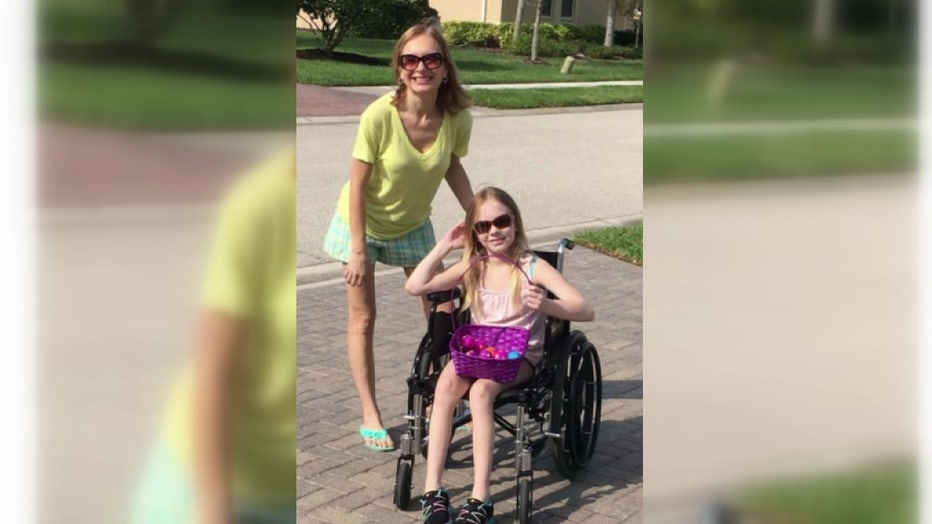
Pictured: Beata and Maya Kowalski
Maya’s former Guardian Ad Litem, Jessica Blackrick, testified that Bedy cut a phone short a phone call in which Maya and her mother were praying together.
Blackrick added that a phone call that Maya wanted to make to her mother on Thanksgiving was blocked by Bedy because she couldn’t make herself available to monitor it. Blackrick went on to state that she never told Bedy to monitor those phone calls.
RELATED: ‘Take Care of Maya’ trial: Plaintiff claims $220M lawsuit is about parental rights
Lindsey Masica, who worked for DCF as a child protective investigator while Maya was at Johns Hopkins All Children’s Hospital stated during her testimony that she knew Bedy was listening in on phone calls between Maya and her mother.
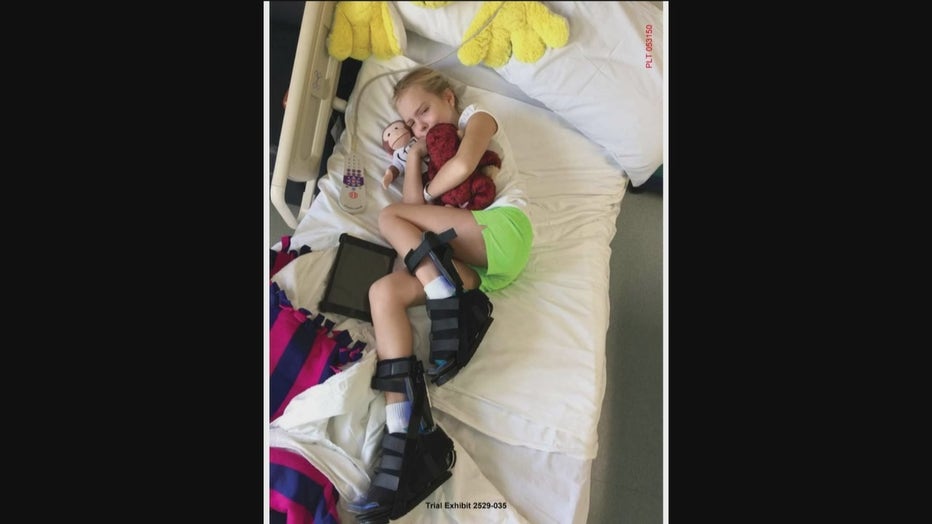
Pictured: Maya Kowalski with boots on her feet.
Why was Maya taking ketamine?
Beata Kowalski, who was a registered nurse, learned about CRPS from an infusion patient and began researching the disease. Her research led her to Dr. Anthony Kirkpatrick, who diagnosed Maya with CRPS and prescribed ketamine treatments.
RELATED: ‘Take Care of Maya’ trial: Doctor who prescribed ketamine treatments testifies in $220 million case
Dr. Kirkpatrick told the jury that initially Maya said the ketamine treatments helped, but not enough so he recommended a high-intensity treatment in Mexico, which he said was a success.
Doctor testifies at ‘Take Care of Maya’ trial
Dr. Anthony Kirkpatrick, the physician who diagnosed Maya Kowalski with Complex Regional Pain Syndrome and prescribed ketamine treatments took the stand in a $220 million case against Johns Hopkins All Children’s Hospital featured in the Netflix documentary ‘Take Care of Maya’.
"He explained the procedure. He talked about how it’s been around for quite a long time. He mentioned it’s used for many things, and it’s safe," Jack Kowalski stated during testimony on Monday. "The side effect when they’re coming out of it is a hallucination for a short time, but then everything is back to normal."
Upon cross-examination of Jack Kowalski, defense attorneys for the hospital questioned the family’s decision to move forward with ketamine coma treatment in Mexico.
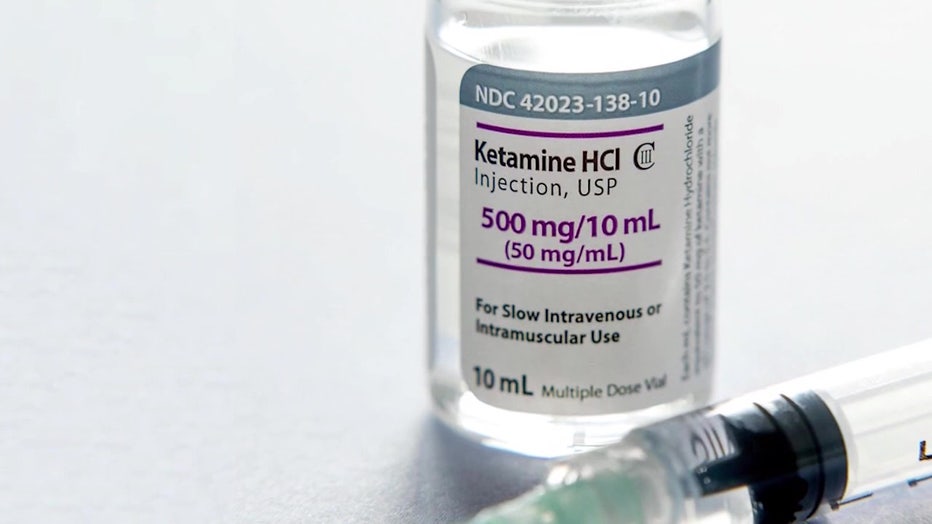
File: Ketamine
"Were you aware that the risk of death from that coma was 50%?" asked Ethen Shapiro.
"There is a risk in every procedure," Jack Kowalski responded.
"I understand that Mr. Kowalski but respectfully there’s a risk and then there’s a risk that’s a coin flip in which your daughter could pass. Did you know it was 50%" Shapiro pressed on.
RELATED: ‘Take Care of Maya’ trial: Doctor who's treated thousands for CRPS testifies on behalf of Maya
"They stated it was 50%, but they stated no one every died from that procedure," responded Kowalski.
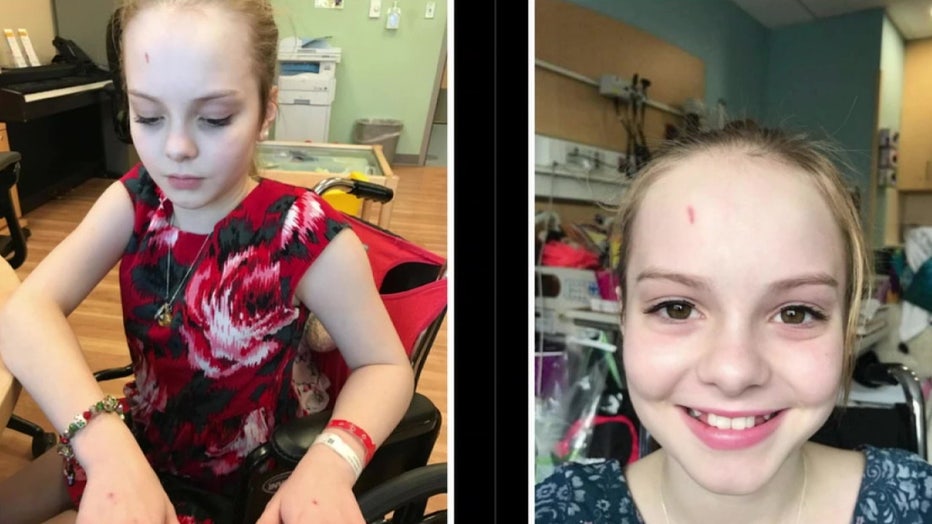
Side by side images of Maya Kowalski as she battled CRPS.
Maya’s father told the jury he and his family saw Maya slowly returning to herself following the ketamine therapy.
Dr. Kirkpatrick shared a similar testimony.
"She could take care of herself, comb her hair, brush her teeth, eat with her hands and so forth" he recalled.
During a video deposition, Dr. Lewis stated that Maya had overheard doctors telling her mother that she had a 50 percent chance of dying during the ketamine treatment, which added to her anxiety.
RELATED: ‘Take Care of Maya’ trial: Doctor who prescribed ketamine treatments testifies in $220 million case
When Maya relapsed in 2016, the Kowalski family says staff at Johns Hopkins All Children's Hospital didn’t agree with the ketamine treatments.
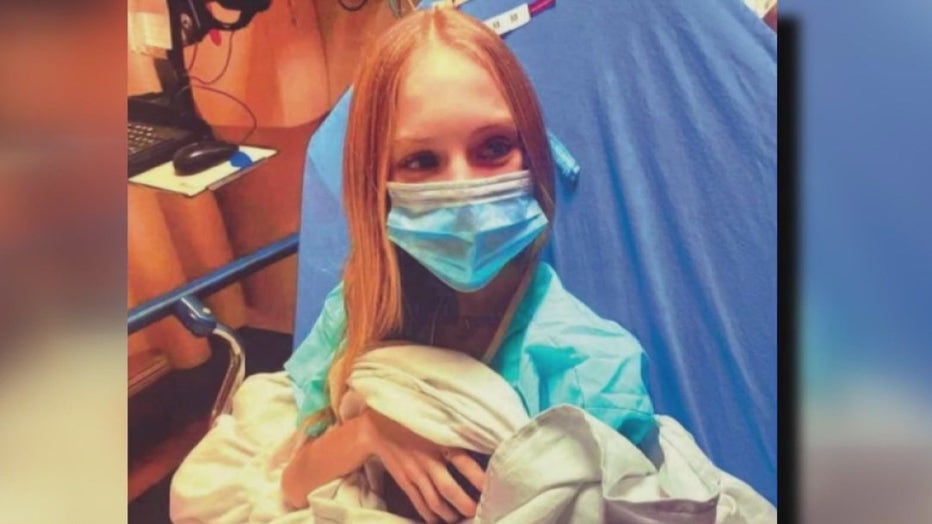
Maya Kowalski in the hospital.
Dr. Kirkpatrick said he discussed Maya’s condition with the hospital.
"I emphasized that if she doesn’t get the ketamine, it’s going to be a slow, painful death," Dr. Kirkpatrick stated.
Dr. Fernando Cantu, the doctor who administered Maya's ketamine coma, explained to the jury that while it will not cure CRPS, ketamine is a treatment for the disease.
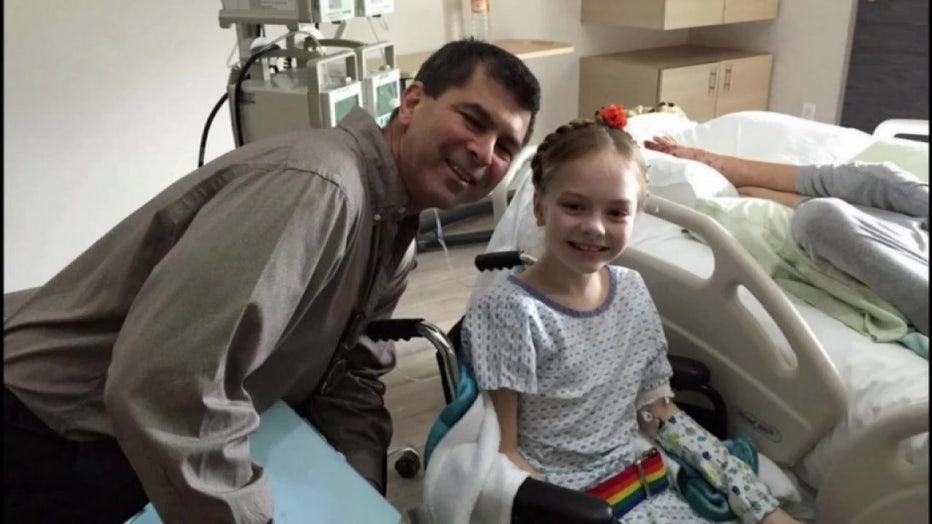
Maya and her physician Fernando Cantu.
Ketamine controversy
Dr. Elliot Krane, professor emeritus of anesthesiology from the Stanford University School of Medicine, who helped launch the pediatric pain center at Stanford University and treated lots of children with CRPS, testified that though he never treated Maya, he did review her medical records and does not believe she suffered from CRPS.
He also told the jury that he believed Maya had become dependent on ketamine and had developed a tolerance to it.
Medical expert testifies about Maya's treatment
Dr. Elliot Krane, an expert from Stanford University who has experience in pediatric pain management and Complex Regional Pain Syndrome, took the stand on Tuesday morning for the defense and was cross-examined in the afternoon. He stated that the ketamine treatments Maya was given was not the standard care for a child with CRPS.
"They can’t wait to get their next dosage of ketamine, they’re anxious, sometimes begging for ketamine. They feel pain, because it’s all the opposite of what ketamine does," Dr. Krane said.
Medical staff at Johns Hopkins All Children's Hospital told jurors that Maya was swearing at them and demanding sedatives when she was brought to the facility in October 2016 for what she described as a flare up from CRPS. Dr. Krane stated that he believes the abdominal pain that led Maya's parents to bring her to the hospital in 2016 was actually caused by ketamine.
Dr. Jenny Dolan, the chief of pediatric anesthesiology at Johns Hopkins All Children’s Hospital, testified on behalf of the defense on October 31.
She said physical therapy, occupational therapy and cognitive behavior therapy is usually used to treat children with CRPS.
Pediatric anesthesiologist testifies in $220M case
Dr. Jenny Dolan told jurors she was shocked by the amount of ketamine Maya Kowalski had been receiving.
She said in her 20 years of experience she had never seen high-dose, anesthetic-dose ketamine used to treat CRPS in children.
Dr. Dolan added that she was concerned about the ketamine doses Maya had been prescribed and was given the day before she was admitted to the hospital. She said the first time she met Maya, Maya was on her bed with her mom and she was trembling, screaming, crying and angry.
"Sometimes she was like in a rage. It was like a very dramatic scene. The communication with the family was difficult during that time," Dr. Dolan stated.
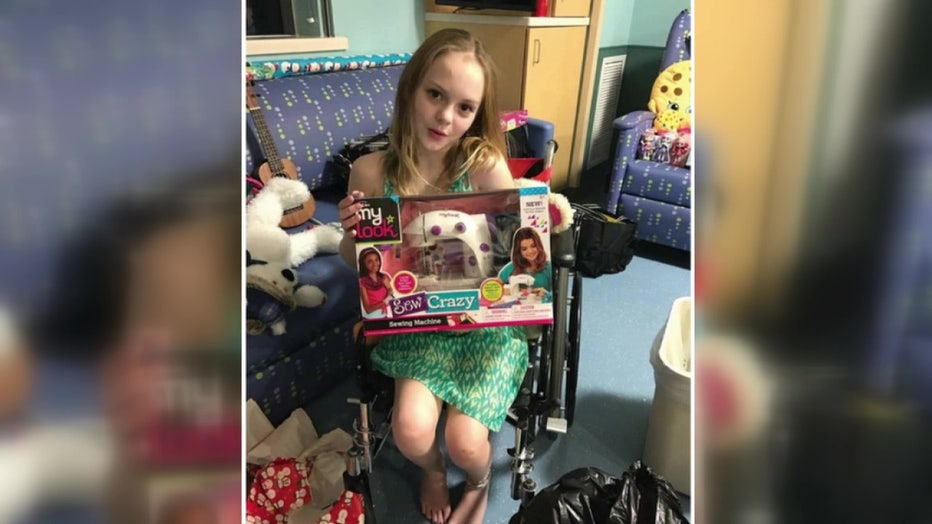
Pictured: Maya Kowalski
Dr. Dolan said as they worked to ween Maya off of high doses of ketamine, her family continued to ask for drugs to treat her pain. At one point, Dr. Dolan recommended psychiatric involvement after seeing the family struggling.
"Both of them got really upset. At some point they used foul language, but they also said ‘we are not crazy. We don’t need that,'" she said. "I said, it’s not that I believe you are crazy. You are living with the burden of a chronic condition and you and your family need the coping mechanism to help with these process."
RELATED: ‘Take Care of Maya’ trial: Maya testifies again in $220 million case against All Children’s Hospital
Under oath, Maya told jurors her condition would leave her screaming in pain and unable to walk at the time.
Maya Kowalski returns to the stand
Maya Kowalski returned to the stand Friday in the "Take Care of Maya" trial happening in Sarasota County. Her family is suing for millions after what they say was medical kidnapping by Johns Hopkins All Children's Hospital.
She explained that the ketamine treatment worked, and she was improving until October 2016, when she says she experienced a flare up of pain.
However, Dr. Krane stated that Maya was receiving 10 times the amount of ketamine for someone her size and she should have been receiving physical, occupational and psychological therapy for the pain she said she was experiencing.
Dr. Krane wasn't the only physician surprised by the amount of ketamine Maya was taking.
"I was quite surprised and shocked at the amount of ketamine that was reported, "stated Dr. Richard Andrew Elliot, an anesthesiologist at Johns Hopkins All Children's Hospital. "They were way higher than any doses I had ever seen given to a child."
Doctors testify in 'Take Care of Maya' trial
On Monday, doctors testified about why they believed Beata Kowalski was suffering from Munchausen by proxy.
Jurors were shown a video deposition of Maya as the defense wrapped up its case. In the video, Maya said she had not received a ketamine treatment since she was released from the hospital and the only medication she takes is for allergies and to help with sleep. She also said she enjoys physical activities such as ice skating, running, swimming and yoga.
In a video deposition of Jack Kowalski that was also played before the defense rested, he said he has not seen any signs of CRPS in Maya recently.
What is Complex Regional Pain Syndrome?
CRPS is a rare pain disease that can follow an injury, and it’s tough to diagnose and sufferers are sometimes accused of faking their pain.
There’s no cure for CRPS and treatments can range from acupuncture and nutrition to physical therapy and massage or ketamine therapy.
Woman describes living with CRPS
As the trial between the family of Maya Kowalski and Johns Hopkins All Children’s Hospital continues, a woman who is also living with CPRS described what living with the illness is like
The Kowalski family attorney argued that the hospital staff refused to believe Maya had CRPS even after Dr. Kirkpatrick, who did not work for All Children’s Hospital, confirmed her diagnosis.
PREVIOUS: ‘Take Care of Maya’ trial: Testimony continues in $200 million case against All Children’s Hospital
The Kowalski family claims that while hospital staff was accusing them of lying about CRPS and refusing to treat Maya, the facility was billing the family and their insurance more than half a million dollars for that exact cause of illness.
However, when Jason Bankert, executive director of Revenue Cycle at Johns Hopkins All Children’s Hospital, took the stand, he explained that while there was a diagnosis code on for Complex Regional Pain Syndrome on documents showed to the jury, there were also codes for child neglect or abandonment among a list of other codes for 12 other diagnoses. He went on to explain that patients are charged for services rendered.
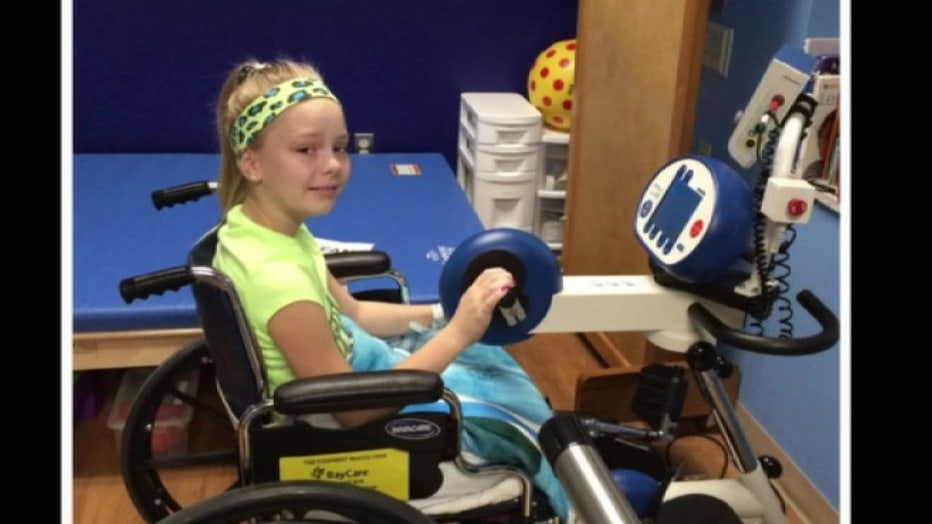
Pictured: Maya Kowalski
Bankert added that the vast majority of the charges billed while Maya was in the hospital from October 2016-January 2017 were for room and board, respiratory therapy, physical therapy and occupational therapy.
RELATED: ‘Take Care of Maya’ trial: Judge, lawyers discuss jury instructions in $220M case
An economist detailed expenses the family has incurred and will incur on the future and came up with $220 million.
In addition to compensatory damages, the family says it is also asking for punitive damages to punish the hospital and deter the facility from doing something similar in the future.

